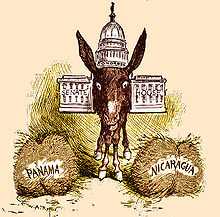Paradox of tolerance
The tolerance paradox arises when a tolerant person holds antagonistic views towards intolerance, and hence is intolerant of it. The tolerant individual would then be by definition intolerant of intolerance.
Discussions
Michael Walzer asks "Should we tolerate the intolerant?" He notes that most minority religious groups who are the beneficiaries of tolerance are themselves intolerant, at least in some respects. In a tolerant regime, such people may learn to tolerate, or at least to behave "as if they possessed this virtue".[1] Philosopher Karl Popper asserted, in The Open Society and Its Enemies Vol. 1, that we are warranted in refusing to tolerate intolerance. Philosopher John Rawls concludes in A Theory of Justice that a just society must tolerate the intolerant, for otherwise, the society would then itself be intolerant, and thus unjust. However, Rawls also insists, like Popper, that society has a reasonable right of self-preservation that supersedes the principle of tolerance: "While an intolerant sect does not itself have title to complain of intolerance, its freedom should be restricted only when the tolerant sincerely and with reason believe that their own security and that of the institutions of liberty are in danger."[2]
Homophily and intolerance
The relation between homophily (a preference for interacting with those with similar traits) and intolerance is manifested when a tolerant person is faced with the dilemma of choosing between establishing a positive relationship with a tolerant individual of a dissimilar group, or establishing a positive relationship with an intolerant group member. In the first case, the intolerant in-group member disapproves the established link with an other-group individual, leading necessarily to a negative relationship with his tolerant equal; while in the second case, the negative relationship toward the other-group individual is endorsed by the intolerant in-group member and promotes a positive relationship between them.
This dilemma has been considered by Aguiar and Parravano in Tolerating the Intolerant: Homophily, Intolerance, and Segregation in Social Balanced Networks,[3] modeling a community of individuals whose relationships are governed by a modified form of the Heider balance theory.[4][5]
See also
"The Death Camp of Tolerance", a South Park episode which deals with the paradox.
References
- ↑ Michael Walzer, On Toleration, (New Haven: Yale University Press 1997) pp. 80-81 ISBN 0-300-07600-2
- ↑ Rawls, John, (1971). "A Theory of Justice". p. 220
- ↑ Aguiar, F.; Parravano (2013). "Tolerating the Intolerant: Homophily, Intolerance, and Segregation in Social Balanced Networks". Journal of Conflict Resolution. doi:10.1177/0022002713498708.
- ↑ Heider, F. (1946). Journal of Psychology 21: 107–12. Missing or empty
|title=(help) - ↑ Heider, F. (1958). The Psychology of Interpersonal Relations. New York: John Wiley.
External links
- The Concept of Toleration and its Paradoxes, in Stanford Encyclopedia of Philosophy.
- The Paradoxes of Tolerance, Barbara Pasamonik in Social Studies, v95 n5 p206 Sep-Oct 2004.
- "Puzzles and Paradoxes of Tolerance", Hans Oberdiek, 2001.
- Tolerating the Intolerant, Michael Totten.
| ||||||||
